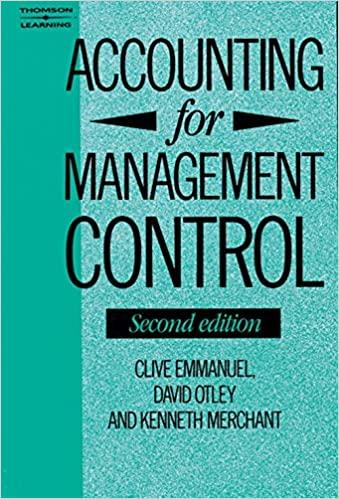The performance of the Tripie Crown Chemical Division of Industrial Chemicals Ltd is appraised by the residual
Question:
The performance of the Tripie Crown Chemical Division of Industrial Chemicals Ltd is appraised by the residual income method, and the divisional manager, Dr Williams, has the power to dispose of redundant assets. The division has an asset with a written-down value of f50000. For the purpose of calculating residual income, the asset is depreciated at f5000 per annum (10-year life, nil scrap value).
Residual income is charged with interest at 10% per annum on written-down value at the beginning of the year.
Dr Williams considers that the asset's cash flows, net of out of pocket costs, will be 0000 per annum for 5 years and 0000 per annum for a further 5 years, giving an expected present value of 03657. An opportunity to seIl the asset for 00000 has arisen.
After the current year, the disposal value of the asset will be negligible. Residual income will be charged with any book loss on the disposal of the asset.
Required:
(a) If Dr Williams decided to seIl the asset, would his decision be in the best interests of Industrial Chemicals Ltd?
(b) Should Dr Williams, who is ambitious and believes that his promotion prospects depend on high profit performance in the current period, retain or seIl the asset?
(c) If Dr Williams had only recently been appointed as divisional manager, would he retain or seIl the asset?
(d) What difference, if any, would it make to your decisions in parts (a) and (b) if the asset could be sold for 05000 instead of OOOOO? What conclusions might you make about the usefulness of RI in this instance?
Step by Step Answer:






